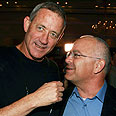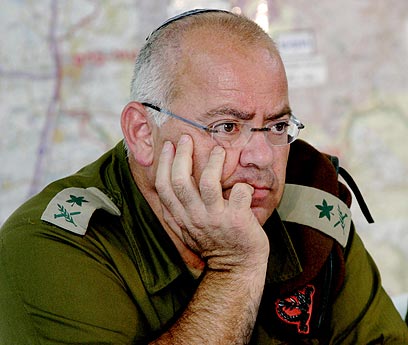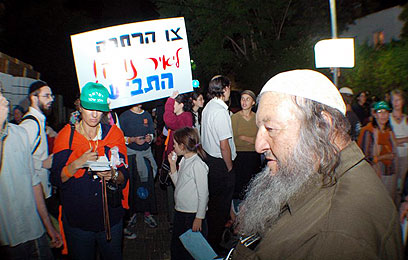
When Naveh leaves office, his picture will be added to the wall too, with the same serious expression reserved for official photos, but also with a skullcap on his head – which none of his predecessors had.
"Definitely," Naveh responds in an exclusive interview to Ynet in honor of of the Passover holiday. "But will a religious chief of staff face more difficulties? I think so. Will the people of Israel find it difficult to accept a religious chief of staff? I think so too. Although a religious chief of staff could be excellent, the public has a problem with it.

"I was a chief of staff candidate for half a day, and look at the number of articles and petitions issued against me. The Left doesn't like me because they think I'm a rightist, and the Right doesn't like me because they think 'm a leftist. Those ask why I did the disengagement, and those ask why I only did the disengagement.
"Everyone has something to say, including in the synagogue. Unfortunately, the Israeli public is not ready to accept something that is allegedly not at the center of consensus. I say allegedly, because as far as my real values are concerned – they are definitely in the center of consensus."
During the disengagement you were under fire by the religious public, which accused you of treason. This probably didn't make you feel like part of the consensus.
"The religious public, which I am part of, which is my own flesh and blood, has undergone a metamorphosis in the past 10 years. My father and grandfather were Mafdalniks (members of the National Religious Party) and did not consult the rabbi on every single thing, like whether the girl they are dating is kosher or not.
"They knew how to open a book, gave room to independent thought, made the distinction between public leadership and religious leadership. Today it's different.
"When I studied at Netiv Meir Yeshiva and used to go to Bnei Akiva, people knew that the existence of the people of Israel depends on three things – the people of Israel, the Torah and the Land of Israel. The people of Israel has a central place, it was favored over other things.
"Unfortunately, in the past 15 years we have become confused. It's no longer like that. Religious Zionism is in complete decline. We have disposed of integrity and personal reason, the ability to accept the other, and we connect to 'make for yourself a rabbi' in its simplistic meaning."

Protest outside Naveh's home (Photo: Niv Calderon)
Naveh also slams the religious perception which put the idea of settling in the Land of Israel above all. "This is what had led us to a slippery slope," he says. "Going to Judea and Samaria instead of to the north as a perception, or choosing a religious – rather than mixed – form of settlement, is very problematic.
"This is how new ways are created, like the haredim, which will become the big bloc in several years, and religious Zionism – which I belong to – will disappear.
"I would like to clarify that I didn't get any role in the army for being a Mafdalnik. On the contrary, it was always harder. But our public liked to see me as belonging to them, and then suddenly felt betrayed. But I never felt as an emissary of that private public.
"A person who seeks to be a public figure cannot be an emissary of one part of the people. There are some who don't understand it, and then there are unpleasant feelings. Unfortunately, the same is true today."
Are you angry, or have you accepted it?
"I can't accept it, and I feel disappointment and pain, but no anger. I know how to live with it. Do I feel comfortable when people protest outside my house? Of course not, it's a disgrace.
"Today most of our public, which really is a good public, Zionist and wants to contribute, takes up more commanding roles in the army.
"So on the one hand it's an excellent public, but on the other hand there is 1% or 1.5% which are bad and commit sins, causing damage to the people of Israel by uprooting trees and violence against the Palestinians and cause defamation of God. And when the public sits on the fence and keeps quiet about it – it hurts me."
Spirit of yeshiva
Naveh, 54, has four children and lives in Zichron Yaakov. When he was young he studied in Jerusalem's Netiv Meir Yeshiva, from which he graduated with two other major-generals – Elazar Stern and Yishai Beer, as well as Chief Military Rabbi Brigadier-General Rafi Peretz.
What was so special about your class, that such a group came out of it?
"Our class was the class that enlisted after 1973. In accordance with the spirit of the yeshiva, we were guides in Bnei Akiva and spent the war volunteering. Each one of us saw himself as part of the national war effort.
"On this backdrop, there was an agreement that those who don't go to the 'hesder' (yeshiva program which combines advanced Talmudic studies with military service) will go to commanding roles, as a worldview."
Do you find any sacredness in the army?
"The army isn't scared, but it's clear to me that when I reach God and he asks me, 'Have you anything to say in your defense?' I'll get some kind of credit for the roles I did in the army. You don't do it for livelihood or for respect, but in God's name, at least until you reach the senior ranks, where ego is involved too.
"When I look at my life, I feel no shame over what I have done for the people of Israel."
Are you celebrating the Seder in the army?
"No, I'm home. I have grandchildren."
We left Egypt , but now it's making headlines again. Do we have anything to fear?
"There is no Egyptian threat. We are in a situation of peace, and we don’t have to imagine things. The story in Egypt is deeper than what is seen on the surface.
"In Egypt what was heard was mainly the voice of the young generation on the streets, rising up against the injustice it feels is being done. In general, Egypt is ruled by a secular political perception. It has a variety of opinions, and both the current government and the army we work with are committed to peace.
"A possible danger is that different parties will enter on the wings of democracy and become a majority or affect the political processes in Egypt. I am mainly talking about the Muslim Brotherhood, which was born in Egypt decades ago.
"The danger is the same as in other places – Hamas rose to power in democratic elections, and in Iran Khomeini won the elections in 1979. We have to be more alert, that's for sure."
Visible miracles all the time
Although the interview is held several days before Passover, there is no Haggadah on Naveh's table, but a new edition of Pirkei Avot (tractate in the Mishna). Within the pressure, it seems, there is some time to study.
"From a religious point of view, the army is the easiest thing for a religious guy," he explains. "After all, 90% of religion is faith, and 10% is the ability to observe mitzvot. In terms of faith – there can't be an easier place than the army.
"You see visible miracles all the time: When you hit an explosive charge and it doesn't explode, or when there's a clash with terrorists and you kill the cell a moment before it enters a community.
"From a halachic aspect as well, the army in recent years is simply a glasshouse. There is no problem with kosher food, no problems between men and women, no temptations, no Shabbat problem – either you can do it because it's operational or you can't do it.
"The army is the place with the highest potential of maintaining faith and Halacha in the State of Israel."
- Follow Ynetnews on Facebook















